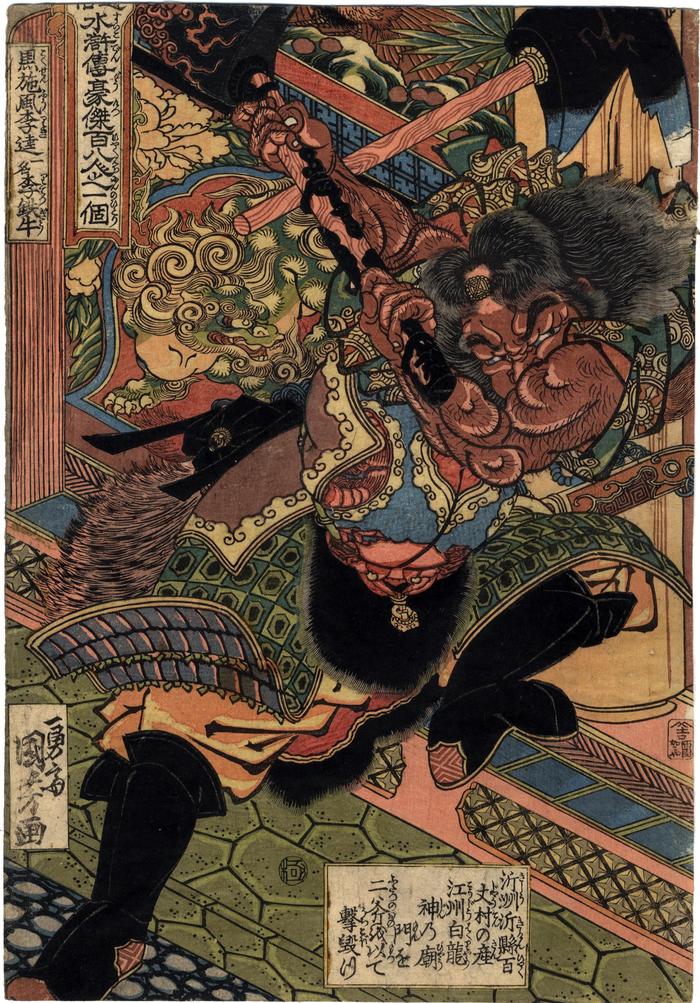Utagawa Kuniyoshi (歌川国芳) (artist 11/15/1797 – 03/05/1861)
Li Kui, the Black Whirlwind, also called Iron Ox (Kokusenpū Riki - 黒旋風李逵), from the series The Hundred and Eight Heroes of the Popular Suikoden (Tsūzoku Suikoden gōketsu hyakuhachinin no hitori - 通俗水滸伝豪傑百八人之一個)
ca 1830
9.5 in x 13.75 in (Overall dimensions) Japanese color woodblock print
Signed: Ichiyūsai Kuniyoshi ga
一勇斎国芳画
Publisher: Kagaya Kichiemon
(Marks 195 - seal 22-025)
Censor's seal: kiwame
Museum of Fine Arts, Boston - dated ca. 1827
British Museum - dated ca. 1827
Lyon Collection - another copy
Royal Museums of Art and History, Belgium (via Cultural Japan)
Art Institute of Chicago
Chiba City Museum of Art We first encounter Li Kui in Chapter 38 of the Outlaws of the Marsh on page 194. Song Jiang and Dai Zong were having a friendly chat.
They talked intimately and without reserve. Before they had finished more than two or three cups of wine they heard a tumult of voices on the floor below. The waiter hurried into their room.
"Who's raising all that row down there?"
"It's that brother Li we often see you with, the man called Iron Ox. He's trying to borrow money from the host."
Dai laughed. "That rascal is misbehaving again. I could imagine who you meant." To Song Jiang he said: "Excuse me a minute brother. I'll bring him up."
Dai went down the stairs and soon returned with a big dark-complected fellow. Song Jiang was taken aback by the man's appearance.
"Who is this brother?" he asked the superintendent.
"One of our prison guards, Li Kui, from Baizhang Village, Yishui County, in Yizhou Prefecture. He's nicknamed Black Whirlwind. In his naive parts he's also known as Iron Ox. He had to run away from home because he beat a man to death. He wandered to Jiangzhou and here he's remained, although later there was an amnesty. Because he's nasty when he's drunk, many people are afraid of him. He can wield two battle-axes, and he's good with fists and cudgel. He's on our prison staff.
****
The text on the bottom reads:
沂州沂県百丈村の産 江州白竜神の廟門を二斧を以て撃毀つ
****
Kokusempu Riki (otherwise called Ritetsu-Gyu) in a drunken fury attacking the gate of the Hakuryū-jin (White Dragon Temple - 白竜寺) with a huge axe; another axe already buried in the woodwork (he had been expelled from the temple, of which he was formerly a priest).
****
Li Kui is one of the heroes mentioned the most often in the Suikoden. Perhaps hundreds of times. In Chapter 38 he is described as “One of our prison guards, Li Kui, from Baizhang Village, Yishui County, in Yizhou Prefecture. He's nicknamed Black Whirlwind [黒旋風]. In his native parts he's also known as Iron Ox. He had to run away from home because he beat a man to death. He wandered to Jiangzou and here he's remained, although later there was an amnesty. Because he's nasty when he's drunk, many people are afraid of him. He can wield two battle−axes, and he's good with fists and cudgel. He's on our prison staff.” He was often drunk and violent and was forever hitting people up for money.
****
Illustrated
1) in Kuniyoshi by Juzo Suzuki, Heibonsha Limited, Publishers, 1992, no. 84.
2) in color in Ukiyo-e Masterpieces in the Collection of Chiba City Museum of Art (千葉市 美術館 所蔵 浮世絵 作品選 - Chiba-shi Bijutsukan shozō ukiyoe sakuhinsen), 2001, p. 75, #172.
3) in color, the whole triptych in Ukiyo-e From Prague Revisiting Japan (プラハ 国立 美術館 所蔵 浮世絵展 : 開館 200周年 記念), 1995, p. 54.
4) in color in 'A constellation of sources. Shuntei, Toyokuni I and the genesis of Kuniyoshi's warrior prints' by James King in Andon 78, March 2005, p. 13.
5) in a full-page color reproduction in Of Brigands and Bravery: Kuniyoshi's Heroes of the Suikoden by Inge Klompmakers, Hotei Publishing, 1998, page 93, #22.
****
There is another copy of this print in the Hachinohe Clinic Machikado Museum.
Kagaya Kichiemon (加賀屋吉右衛門) (publisher)
warrior prints (musha-e - 武者絵) (genre)
Suikoden (水滸傳) (genre)
